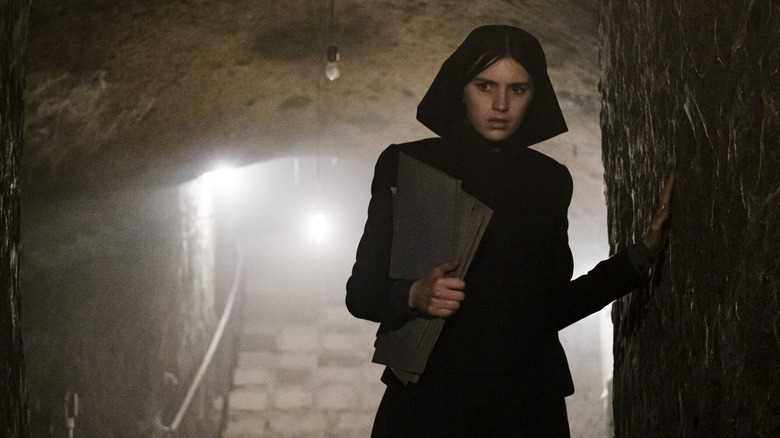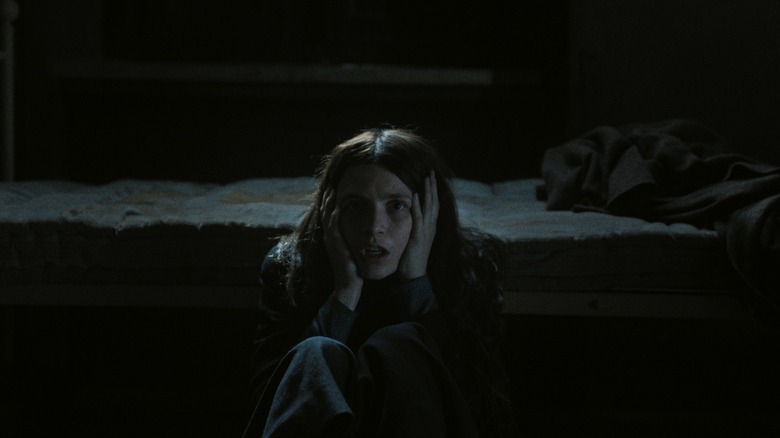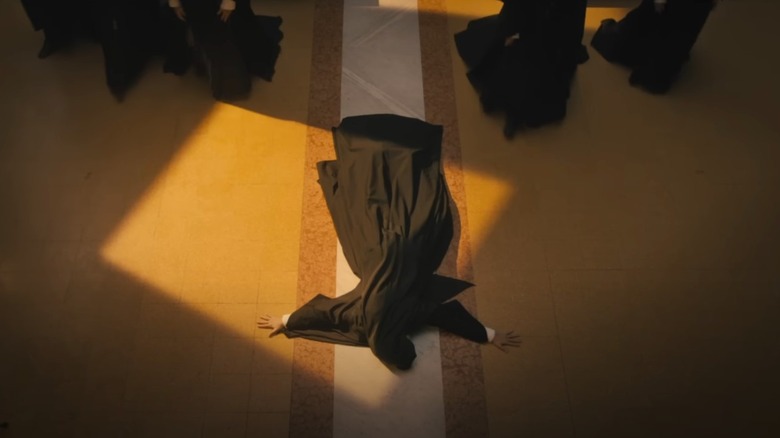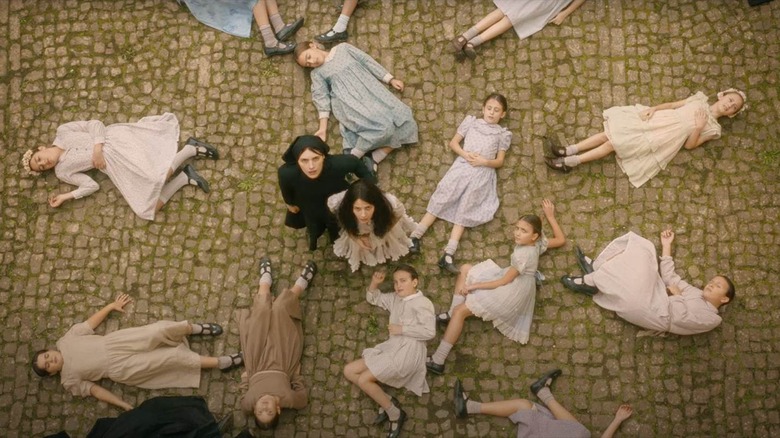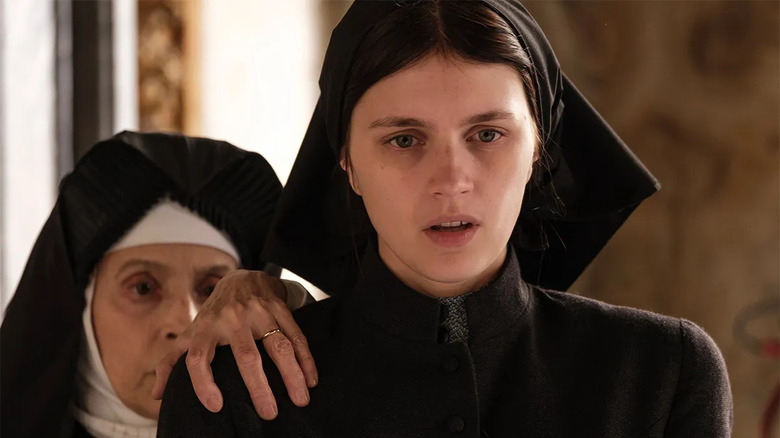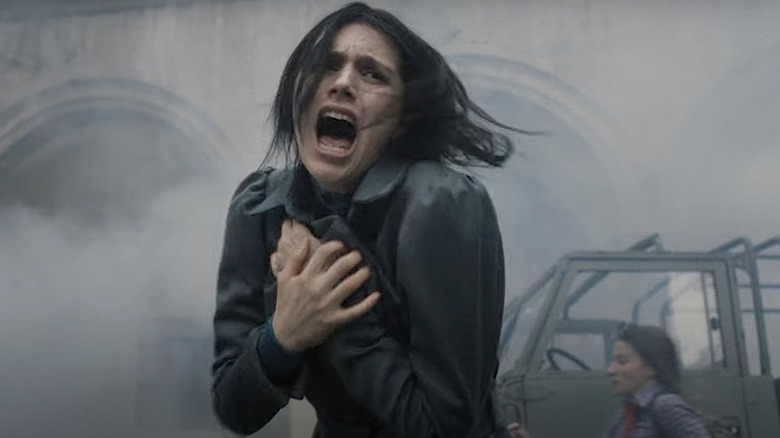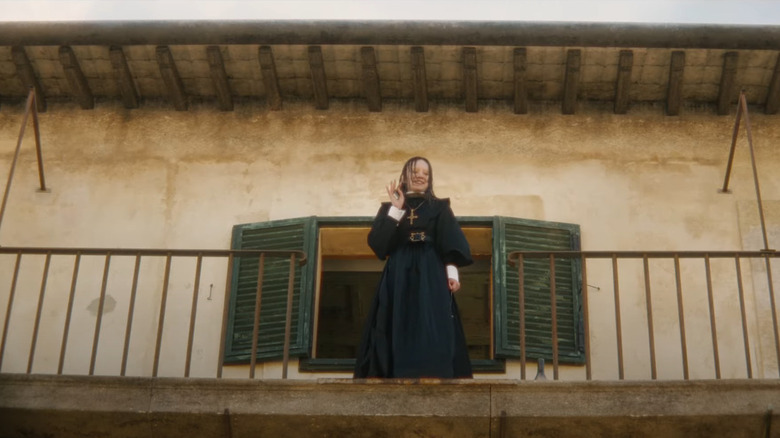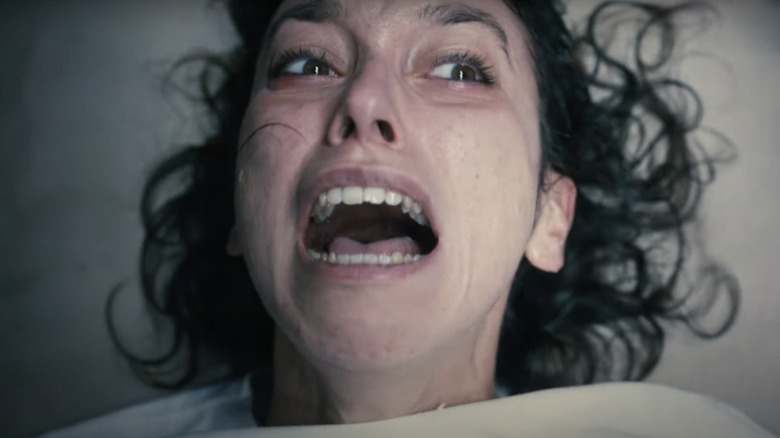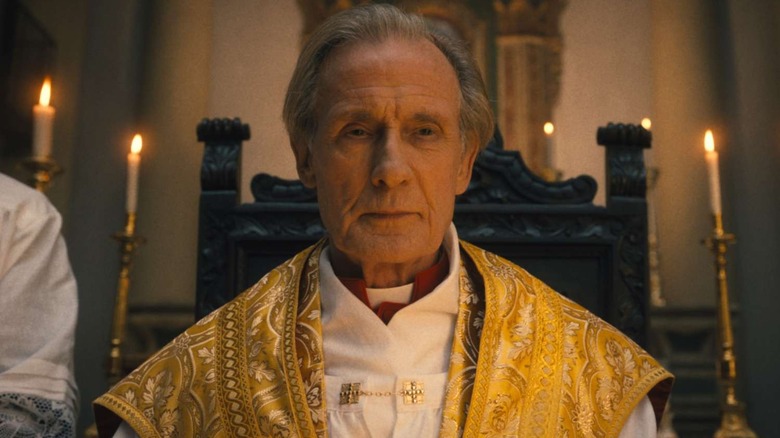The First Omen Pays Homage To One Of The Greatest Horror Performances Of All Time [Exclusive Interview]
Richard Donner's 1976 horror film "The Omen" is an undeniable classic. The supposed real-life curse surrounding the film's production has transported the movie to a level of infamy, and countless horror fans can recall the first time they saw a bright-eyed nanny exclaim "It's all for you, Damien!" before intentionally hanging herself in full view of an audience of horrified child's birthday party attendees. The film spawned three sequels and a "time to profit off the 06/06/06 calendar date" remake in 2006, but plenty of horror fans still view the original "The Omen" as sacred text. Fortunately, this is how "The First Omen" co-writer/director Arkasha Stevenson and co-writer Tim Smith view the film as well.
The latest genre release from 20th Century Studios, "The First Omen" is a prequel film set in the 1970s, dovetailing directly into Donner's 1976 masterpiece. The story follows a young nun named Margaret (Nell Tiger Free) who joins a convent in Rome, only to discover a horrific conspiracy to bring forth the Antichrist. This is how Damien was brought into this world, and the lengths people went through in the hopes of stopping it.
I recently spoke with Stevenson and Smith ahead of the film's release in theaters but following the jam-packed premiere, which had audiences screaming, gasping, and cheering throughout. On paper, "The First Omen" may sound like another instance of a studio trying to turn a quick profit off of recognizable IP, but the beautifully blasphemous and brutal tale the creative team are bringing to the screens prove that this prequel film is here to bring the gruesome goods. Here's our conversation, where we talk about how the film pays homage to one of the greatest horror performances ever, the embarrassing reason the MPA wanted to give the movie an NC-17 rating (to be clear, it's embarrassing for the MPA, not the filmmakers), and much more.
Note: This interview has been lightly edited for clarity and brevity, and contains spoilers for "The First Omen."
'The evil isn't going away'
Over the years, I've spoken to countless folks in the horror-sphere and many of us have stories watching "The Omen" probably too young, but I think we all turned out fine. What are both of your relationships with the original "Omen?"
Stevens: When I was a kid, A&E had this double feature on Valentine's Day, which I thought was super appropriate: It was "The Exorcist" and "The Shining." [laughs] I was obsessed with it. And so my mom was like, "Oh, if you like those movies, you should watch this." And then she showed me "The Omen" and I was already in love with Gregory Peck at such an early age. So yeah, I was seven, and no, I'm not okay. [laughs]
Smith: Yes, I was around the same age, super young, and I watched a lot of horror films that were more kind of supernatural or otherworldly, and this was the first one I saw that kind of made that feel real and kind of grounded it in reality. So that terrified me. I kind of watched it and thought this could actually happen, which was super scary at the time and very memorable.
There's something inherently real-feeling about so much of this religious horror, but films like "The Omen" and "The Exorcist" came with this boom of religious horror and exploitation post-Hays Code, when films were starting to take these giant swings, but the Catholic Church still was pretty powerful. Obviously the church is still powerful today, but we're becoming a more and more secular society. At the same time, films are becoming more sanitized. So it feels like "The First Omen" is coming out in the inverse of when the original came out.
Stevens: Yeah, what's kind of interesting about that is I think that you're right: We are becoming more and more secular as people, but the evil isn't going away. So I think it's making us realize that the supernatural elements are really not to blame. They're really just kind of a frontman for the darkness that really just lays in all of our hearts. And I think that was kind of how we wanted to approach "The First Omen," because the devil now is quite fun and sassy. So I think really thinking about the devil being a tool for human beings who are trying to use him in a way to get more control — and really, we were thinking about terror being spiritualized and the ways people use terror as a weapon against people, and that was really what we were focused on.
Smith: We try to extrapolate this idea of institutions in power and how they respond to feeling threatened, beyond the Catholic Church, which I think can apply to a lot of what's going on right now. I think, like you said, that film was so good, "The Omen" in '76, in turning a mirror to the horrors of its time, and we really wanted to do the same with this film. So while the Catholic Church isn't as prominent, I think institutions in power, how they respond to fear, how they cling to that power when they're under threat — that really resonated with us, and we completely experienced this idea of content being more sanitized. I totally agree. I think right now it's difficult sometimes to push the envelope and get more boundary-pushing imagery out there.
On bringing the horrors of today into the 1970s
Absolutely. And I love that you wanted to speak to these institutions of power because I'm a lesbian, so I've been told my entire life that I'm going to burn in hell, and that stops being scary when you hear it so often. But the things that do scare me are these institutions that do have so much power, and I really loved that this film took this very 2024 approach to dismantling institutions but still allowed it to be a prequel film set in the 1970s. So when you were developing this story, what was it like to get into the mindset of this bygone era?
Stevens: It was interesting just because we love 1970s horror so much, and I have so many childhood memories of watching these movies, so there's such a nostalgia baked into it for me. And we wanted to make people feel safe through that aesthetic and trying to recreate that aesthetic as much as we could so that possibly it felt like we had actually shot in the '70s, but then really contemporize the film by talking about issues that are really pertinent right now and I think terrifying most of the country. I think there's kind of subtle messages that all women should burn in hell is what we're told growing up, and especially if we express our sexuality or embrace our bodies. So I think that was something we were really excited to talk about with the film.
Smith: It was so important to us that the film didn't feel like an artifact of the 1970s, that the horrors that it's speaking to really resonate and feel very pressing and kind of disturbingly familiar. But like Arkasha said, we love those films. So the style that those films were made in soaks into our bloodstream in a way because we've watched so many. Trying to make a film in that style was so much fun, but it had to feel modern in what it was obviously talking about.
The intentional costuming of The First Omen
I think the visual language of the film also really enhances that point. I love the costume design in this movie, and when you see all of these little girls at the orphanage, they are in very '40s, '50s style dresses, but then we have the nuns going out to the disco and it is very clearly the 1970s. So you're showing visually one world that's clinging to the past and one that is trying to push forward, be progressive, and do something. I thought that was really interesting because I think even films in the '70s sometimes forgot that there were also generational conflicts happening at that time. So I think you did that very, very beautifully. That wasn't a question. That was just me complimenting you.
Stevens: Thank you so much. Also, I just want to say you're the only person who's picked out kind of the style of the little girl's dresses at the orphanage, because we wanted to kind of create this feeling that they're not really taken care of. They're just hand-me-downs.
That's exactly how it reads, where it feels like, "Okay, you're here, but we know there's a different concentration happening with everybody in the system, and it's not taking care of these girls."
Stevens: Yeah, exactly. Thank you so much. And then exactly with the disco. It's like disco in itself was a cultural rebellion, and it was so exciting to have this little disco moment. So thank you for noticing all that.
'Servant' earned Nell Tiger Free the leading role
You're very welcome. You also have so many time-honored greats in this film, like Bill Nighy, Charles Dance, and Ralph Ineson. You have the Spider Woman herself, Sônia Braga is here, but then you have this absolute force named Nell Tiger Free. What was the process like in finding her? Because I watched "Servant," I know she's great, but for those who may not be familiar with her work, she's phenomenal.
Smith: Honestly, it was a wild experience because development lasted for quite a while and then all of a sudden 20th [Century Studios] said, "The film is greenlit. You're going to Rome right now." And we didn't know who we were casting for anything. We didn't really even know if the film was going to happen. And on the plane to Rome, we rewatched "Servant" and kind of landed in Rome saying, "Nell is Margaret." And then we got to talk to her and she was kind enough to do a reading of a scene, and it was one of the more emotionally devastating moments in the film, and she was unbelievable. So it was a really seamless process. She just blew us away. She was amazing.
Stevens: Yeah, she's really fun because she's a very instinctual artist, and so you'll say, "Do you have any questions? Do you want to talk about anything?" And she'll be like, "No, I just want to do it." And that's what she did on this reading, and it was just explosive. And I actually got really teary just because I wasn't expecting such a fireball of emotion to just come out of nowhere. She can do that, and then she can take it all back in and then speak to you as Nell and then dive right back in it. It's a real gift. It's spooky and beautiful to watch all at the same time.
The Possession moment in The First Omen
I love hearing that she's instinctive, because she has so many outstanding moments in this movie. But there's one in particular where I've been sort of describing it to people as this moment where she goes full Isabelle Adjani in "Possession," but standing in one spot. So was that a directorial choice? Were you like, "Let's bring 'Possession' into this," or was that her instinct?
Smith: That's a really great way to distinguish it. She's stationary, and that's the distinction from "Possession." I like that.
Stevens: We are obsessed with "Possession." I think that is the queen of all female body horror scenes in cinema history. And I think when we first saw it, sorry, I cry a lot, but I did burst out crying just because it was so ... All these things that you feel that you can't articulate, all of a sudden Isabella Adjani was just expressing them through her body on screen. So we were thinking, what's the climax of this film that is about the female body? And doing a "Possession" homage just felt really very natural. Very scary to do because it's such a sacred scene. But also I think we were just ... there was no control. We were just compelled to do it.
This might've been one of the most electric moments I think I've ever had on set. We had just smashed up that car and then cleaned up the glass, and then Nell walks onto set and it's 4:00 a.m. Everybody's tired. This is probably the seventh day of shooting. People don't really know each other that well. And also, people don't really know the film that well and the world that we're in. And I said, "Do you want music? Do you want this? Do you want a closed set?" [And she said] "No, I'm just going to do it." And then she did two takes. That's all she did. And each take is about three minutes, and all the women on set were off-screen grunting with her. She conjured up some wild feeling in all the women, and then all the men were really freaked out. It was just this incredible moment.
Bringing femininity into a masculine horror franchise
If it makes you feel any better, I'm also a crier and I definitely did cry during this movie, specifically when the camera locks in on everyone else as she is saying, "Please help me," and they're just staring at her. I was like, "All right, this hits in a way that I was not expecting," and I was sobbing and hoping everybody in the theater thought I had allergies.
Stevens: [Laughs]
There's also something so delightfully cruel about this movie and that you're giving the audience a little bit more insight into Father Brennan, whereas if you know "The Omen," you know that he's going to get really familiar with a lightning rod in just a few years, which feels especially cruel. There's a version of this movie where he's the focus, but it's so much more interesting that he's not the focus. He's important, but he's not the focus. So what was behind the decision to focus on a new character versus a legacy character?
Smith: "The Omen" is so sacred to us as a film, so I think our impulse was to stay away from "The Omen" because it's such a perfect film. And it was only when we read the script and we realized we were focused on this young novitiate named Margaret, who was a new character, that we thought to ourselves, this is obviously going to dovetail with the original, because we're telling the origin of Damien, but also it allows us to do our own thing and to follow this unique perspective. "The Omen" franchise is a very masculine franchise, which is something we've talked about a lot. So to anchor it in this female point of view in Margaret's character kind of gave us a chance to put our own spin on it and to focus on the theme of birth and a lot of themes that are really personal to us. So that was a really important part of signing on and being drawn to the project to begin with.
How The First Omen battled the MPA
When you look at things like "The Omen" or like "The Exorcist," there is an inherent body horror to it because it's something inhabiting you without your consent and terrorizing your body from the inside out. So it is shocking that "The Omen" is such a masculine franchise because it feels like it has all of the markers of being a feminine franchise. And this movie goes so hard into discussing female autonomy and bodily autonomy, to the point where you showed the miracle of life as a nightmare, which it can be for a lot of people. You had to go back and forth with the MPA, who wanted to hit you with the NC-17. So I would love to hear you talk about what that process was like, because once I learned why they were trying to hit you with an NC-17, I was completely unsurprised but also very annoyed, and I'm curious if you were just as annoyed.
Stevens: Yeah, well, obviously very annoyed because we have a lot of gore and a lot of other body horror and a lot of violence in the film.
Smith: Yeah, disturbing imagery.
Stevens: We have a jackal penis. It's not disguised, it's a penis. And none of those were NC-17 moments for the ratings board. But what was, was the birthing clinic. I think what's really interesting is that you can't ask them questions. You can't really understand what it is. You just have to fish around and slowly understand what it is that they find offensive. And the key of this movie for us was that it is a movie about the female body being completely violated inside outward. You can't make a movie about that nowadays without the imagery. I just think it's a bit unethical to hide from the imagery with that. So the shot of the vagina was extremely important to all of us.
What it was originally was just this frontal shot of the vagina and then a hand emerges. And what we slowly discovered was that it wasn't the hand emerging from the vagina that the board found offensive. It was the moment before when we were just showing the vagina, and it was so counter to the theme of this for us, because the horror in the scene is about what is being done to the female body. Like you say, the miracle of life can be a nightmare, and it can be if you're forced into it when you're strapped down like these women. But we never wanted to say the actual female body is grotesque, ever. And that was what it felt like the ratings board was saying to us with those parts. So we ended up having to go to this profile, in addition to the frontal shot, which for me just seemed even more violent and graphic. But sorry, that's the story.
'We wanted to make something that could stand on its own'
Thank you so much for sharing it, because it is one of those things where I think we talk a lot about how American censors have no problem with violence, but they're all hung up on sexuality. And in this instance, it's not even sexuality, it's just anatomy. This is the same visual you would get in a textbook that they're having an issue with. That I think really speaks to our culture, our censorship rules and regulations that we have where you can't even show the actual body part. That's so wild to me. I mean, many people can't even say the word vagina. They'll come up with something cute and weird for it, which is frustrating.
Stevens: That has been a big journey for us, is having men say the word vagina without blinking an eye. It's been very empowering.
Smith: Like a whole scroll with the different terms, the evasive terminology.
So I have time for one last question for you, and all I want to know is how do you hope people feel when they leave the theater after having watched "The First Omen"?
Stevens: I think it was really important for us to not piss off horror fans and not piss off woman fans, but we also wanted to make something that could stand on its own and reinvigorate people back to the franchise as well. So I really encourage everybody to have a really good time at this movie and then also visit the Donner film.
Smith: And I mean, we try to take a lot of big swings. We try, like I said, to speak to horrors that are really personal to us. So hopefully people see it and respond to us trying to push the envelope. And I hope they do see it in theaters because we worked really, really hard to make it a theatrical experience. And I think that's the way it's best enjoyed, is going to see it with a big group of people.
Stevens: We have 35 millimeter prints, y'all!
"The First Omen" is playing in theaters everywhere.
